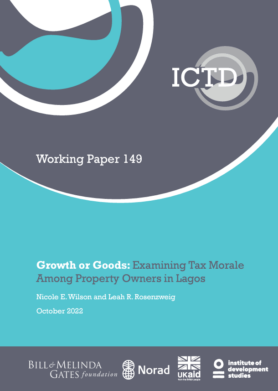Working Paper 149
What motivates property owners to pay taxes in places where state enforcement is weak? Using an online experiment among property owners in Lagos, Nigeria, we evaluate the extent to which different appeals increase respondents’ tax morale, their willingness to pay taxes if there is no enforcement, and attitudes about government enforcement of tax collection. Respondents were randomly assigned to read either a vignette emphasising the role of property tax revenue in contributing to economic growth and increased property values, or one highlighting that tax revenue is used for public goods and services benefiting all residents. The growth message made respondents significantly more favourable towards enforcement of tax collection, but there was no difference in willingness to pay between the two treatment conditions. We also look at heterogeneity across class identification and attitudes toward redistribution, and find that support for a more equal society reduces the advantage of the growth appeal.
A note from the authors: On page 19 of the ICTD working paper we say, “Specifically, respondents who saw the growth vignette were slightly more than one half of a standard deviation higher on the outcomes scale than those who saw the public goods vignette, which is a substantively significant effect.” This should be re-worded to “Specifically, respondents who saw the growth vignette were approximately 0.05 standard deviations higher on the outcomes scale than those who saw the public goods vignette.”
